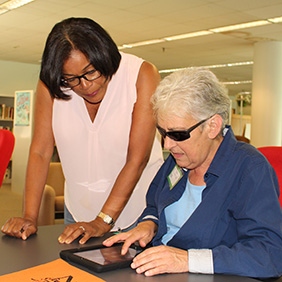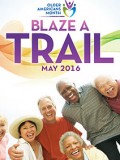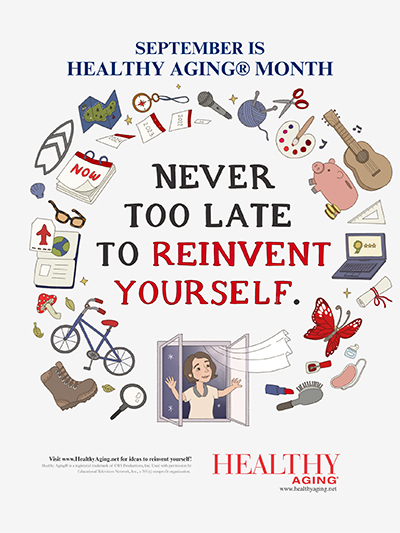
(Left to right) Lolly Cheatham, Nancy Loveland. Photo: Gary Cooper
October is Blindness Awareness Month in the US and all across the country organizations are raising awareness in hopes to put the misconceptions around blindness to rest.
There are millions of people worldwide who are visually impaired and new advances are being made every day to help them, even if it is in the smallest of ways. Whether it be hospitals, schools, or even libraries, local organizations in the US are helping to contribute to Blindness Awareness Month.
In New Jersey, public libraries are at the heart of their communities and play an important role in reaching out to those with print impairments. The New Jersey State Library’s Talking Book & Braille Center (TBBC) has joined forces with state agencies and organizations focused on serving New Jersey’s visually impaired, to enhance access to assistive technology across the state. TBBC has partnered with select public libraries to provide a number of accessibility programs, at no additional cost to residents.
To help raise awareness during Blindness Awareness Month, TBBC is highlighting all of its assistive technology services through a webpage on the State Library website. New Jersey’s Blind Awareness Month resolution from the Assembly was sponsored by Assemblyman Louis D. Greenwald and by Assemblywoman Pamela R. Lampitt, both of District 6 and was signed into law by Governor John Corzine in 2009.
iPad Training for Veterans
Thanks to a grant from Disability Rights New Jersey, TBBC arranged classes to teach two groups of veterans how to use the assistive technology features on iPads, to help reduce the digital divide for veterans with visual impairments or blindness by introducing them to new technologies that can assist them in their daily living. One group had varying degrees of visual impairment; the other group of veterans were totally blind. The training included finger navigation, magnification and text-to-speech features, as well as an introduction to using assistive apps.
Most of the veterans’ sight loss was due to macular degeneration, a disease affecting the macula or center of the retina of the eye which results in progressive loss of central vision. Occurring most often among older people, it is the most common cause of vision loss in people over age 55.
Although all the participants had personal reasons for taking the course, the veterans who still had some sight, like Marvin Horowitz, an Army veteran from Cherry Hill, was preparing for the future. “I have to prepare myself for the inevitable,” he said. “The macular degeneration is making it more and more difficult to see on my devices and PC. This is preparing me and that was my goal.” “These classes were highly beneficial,” said Horowitz. “They exceeded my expectations and will enable me to keep up with what’s happening in the world.”
Virginia Lucas, an Air Force flight nurse during the Vietnam War from Trenton, was taking the course just because she “thought it was about time I got up to date electronically.” Lucas was the second female to join the Veterans of Foreign Wars in NJ and is a 37-year member of American Legion Post 458, Trenton. Her family operated four Tripicin salt water taffy stores in Atlantic City.
Like Lucas, Bruce Groendyke, an Army vet from Hightstown, called himself a “technical dinosaur.” Severely nearsighted, he was learning how to use the iPad to see pictures, videos and to do research, when he does not have access to his home computer.
Nancy Loveland of Forked River, who served in the Marines, agreed with the other vets. “This course was fabulous. It was the right thing at the right time.” As a teacher’s aide at Lacey Middle School she works with 7th and 8th grade special needs children, many of whom have visual impairments.
“For these children, the iPad is the tool of choice, so the school was excited that I was learning how to use it and can now teach those students with visual impairments. It made me a much more valuable person in my role.” Loveland said she practiced on the iPad every day to master it.
Library Equal Access Program
The Library Equal Access Program (LEAP), provides free computer and iPad training classes at assistive technology learning centers located in seven public libraries across the state. Training includes beginner and advanced level instruction on how to use reading magnification and speech software to read websites, emails and other documents. This training also includes an introduction to using the assistive technology features now available on iPads.
This program is sponsored by the New Jersey Commission for the Blind and Visually Impaired (CBVI), and targets adults 55 years of age and older.
“The ultimate goal of the LEAP program is to promote independence and to remove the digital divide for older adults with vision impairments,” said Dan Frye, executive director of CBVI. “LEAP places state-of-the-art technology and training in public libraries to serve people closer to where they live. These classes for those new to iPads or assistive software will expand skills and opportunities.”
The East Brunswick Public Library opened their LEAP Training Room on September 21 with a ribbon cutting ceremony. According to Jennifer Podolsky, library director, the response to the program was unexpected. “We were surprised that all our classes filled so quickly. This just shows the need for this type of program for our residents with visual impairments and how libraries are responding to the needs of our diverse population.”
English To Go!
On October 4, TBBC’s Audiovision radio reading service began broadcasting a series of 3-minute English conversation practice sessions every Tuesday and Thursday in the afternoon and evening. These brief sessions are for non-English speakers and are visually or print impaired.
Volunteer and staff readers have recorded everyday English conversation conducted with friends and neighbors. These scenarios include making appointments over the telephone, ordering at a deli or restaurant, talking with a stranger at the mall, and other situations.
Audiovision is available to those who subscribe to Comcast or Verizon Fios on television, while others may access it through their computer. For those who do not receive Audiovision service or any other library services from TBBC, there are other ways to access the program.
sitecues® by AiSquared
The State Library has added sitecues® to thirty-eight public libraries and three veterans’ homes around the state. sitecues® is an easy-to-use software designed to both magnify and read text, on its website, as well as at all Outspoken Library computer kiosks. This program provides visitors to the website, who rely heavily on online research tools, an easier way to navigate and read documents.
“It also allows us to offer our public library partners an easy-to-use accessibility tool which they can offer to their community members who might struggle to read web pages because of a reading disability or because the text is too small,” said Mary Chute, New Jersey State Librarian.
Professional Training Provides Equal Access to Information
Advancing Opportunities, a leader in assistive technology training, will provide instruction for the computer and iPad training programs. This instruction also includes one-on-one assistance from Lolly Cheatham, assistive technology specialist, who has been instructing for three years.
With patience as one of her prime virtues, Cheatham said the biggest challenge for her students with visual impairments is their level of knowledge of the technology and its terminology. “They have to learn about apps; learn what a rotor is on the iPad; learn gestures to navigate, all of which are new to them.”
“Public libraries are learning centers for new technology,” said Adam Szczepaniak, deputy state librarian and director of TBBC. “These initiatives help boost that level of learning to include not only assistive software for those with vision impairments, but training, as well, which is in high demand by those who need assistance learning how to use an iPad, or who need help browsing the internet because their vision is changing.”












